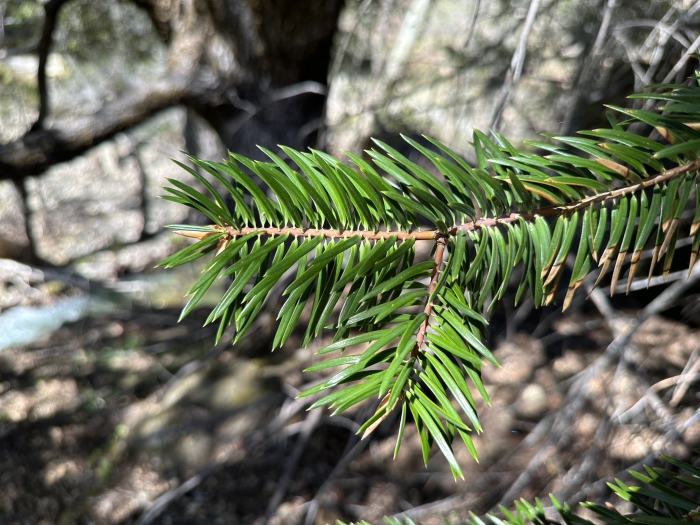Santa Lucia Fir
(Abies bracteata)
Santa Lucia Fir (Abies bracteata)
/
/

Matt Berger
CC BY 4.0
Image By:
Matt Berger
Recorded By:
Copyright:
CC BY 4.0
Copyright Notice:
Photo by: Matt Berger | License Type: CC BY 4.0 | License URL: http://creativecommons.org/licenses/by/4.0/ | Rights Holder: Matt Berger | Publisher: iNaturalist | Date Created: 2023-04-09T11:43:14-07:00 |























Estimated Native Range
Summary
Abies bracteata, commonly known as Santa Lucia fir or bristlecone fir, is a rare evergreen tree native to the Santa Lucia Mountains in California. It is typically found on steep, north-facing slopes and rocky canyons within mixed evergreen and chaparral ecosystems, at elevations of 2,000 to 5,000 feet. The Santa Lucia fir has a slender, spire-like form and can reach heights of 66 to 115 feet (20 to 35 meters) with a narrow crown. Its needles are dark green, and the cones are particularly notable for their long, spreading bristles, which are unique among firs. The species blooms in late spring to early summer.
The Santa Lucia fir is valued for its rarity and ornamental qualities, with its striking conical shape and unique cones making it a point of interest in arboreta and botanical gardens. It is also historically significant, as its resin was used as incense by early Spanish missions. In cultivation, it requires well-drained soils, prefers cooler climates, and should be protected from hot, dry winds. While it is not commonly used in urban or residential landscapes due to its specific habitat requirements, it is an important species for conservation and botanical interest. The tree’s thin bark makes it susceptible to fire, and it is also at risk from pests such as the fir engraver beetle.CC BY-SA 4.0
The Santa Lucia fir is valued for its rarity and ornamental qualities, with its striking conical shape and unique cones making it a point of interest in arboreta and botanical gardens. It is also historically significant, as its resin was used as incense by early Spanish missions. In cultivation, it requires well-drained soils, prefers cooler climates, and should be protected from hot, dry winds. While it is not commonly used in urban or residential landscapes due to its specific habitat requirements, it is an important species for conservation and botanical interest. The tree’s thin bark makes it susceptible to fire, and it is also at risk from pests such as the fir engraver beetle.CC BY-SA 4.0
Plant Description
- Plant Type: Tree
- Height: 60-80 feet
- Width: 15-25 feet
- Growth Rate: Slow
- Flower Color: N/A
- Flowering Season: Non-Flowering
- Leaf Retention: Evergreen
Growth Requirements
- Sun: Full Sun, Part Shade
- Water: Low, Medium
- Drainage: Medium, Slow
Common Uses
Bird Garden, Deer Resistant, Drought Tolerant, Low Maintenance
Natural Habitat
Native to mixed evergreen and chaparral ecosystems within the Santa Lucia Mountains
Other Names
Common Names: Santa Lucia Fir, Silver Fir
Scientific Names: , Abies bracteata, Abies bracteata, Abies venusta, Abies venusta, Picea bracteata, Pinus bracteata, Pinus venusta, Pinus venusta,
GBIF Accepted Name: